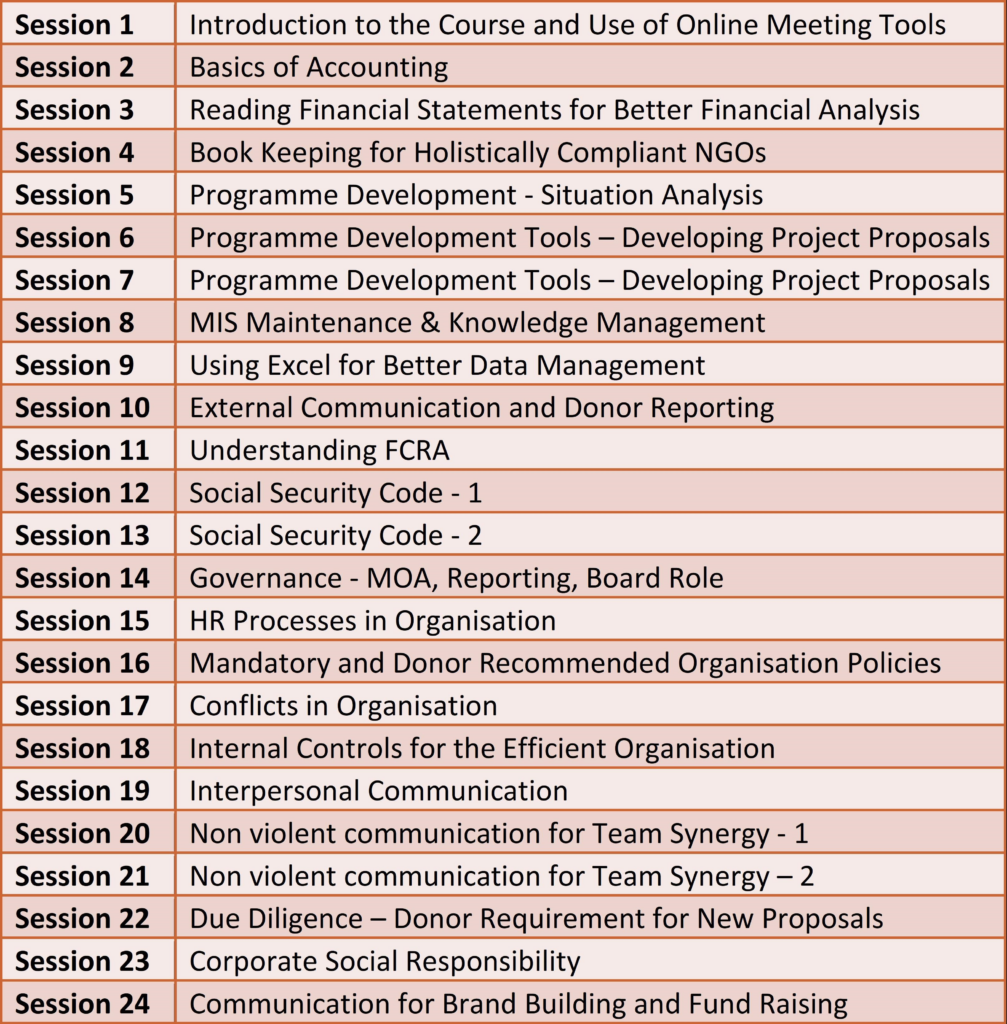(हिंदी के लिए यहाँ क्लिक करें)

You can register for Hindi or English sessions. 24 sessions will include
Introduction to the Course and Use of Online Meeting Tools
Meeting with other participants and knowing each other, Developing familiarity with different online meeting tools to be used during the course, Norms for the sessions, Sharing of content to be covered, Overview of Non Profit Sector in India, Experience sharing by participants
Basics of Accounting
Understand the meaning and function of accounting, basic rules of accounting, type of accounts, accounting cycle and process and understand basis of accounting
Reading Financial Statements for Better Financial Analysis
Understand Primary and Secondary books and accounts, Trial Balance, Income & Expenditure, Receipt & Payment Accounts, Balance Sheet and Cash Flow
Book Keeping for Holistically Compliant NGOs
Understand the meaning of book keeping and the distinction between accounting and bookkeeping. Understand system of recording transaction, type of expenditure, voucher, importance of voucher and vouching process.
Programme Development – Situation Analysis
Developing problem tree and solution tree to identify the root cause and effects
Programme Development Tools – Developing Project Proposals
Writing Aims, objective, outcome, output & activities of a project, Developing Logical frame work & Theory of Change for a project
Programme Development Tools – Developing Project Proposals
Use of Result Framework in planning project implementation, Developing Gantt Chart and activity details, Do No Harm Approach, Risk Analysis, Requirement of a standard project proposal
MIS Maintenance & Knowledge Management
Difference between data and information, Importance of a Kick off process, Developing monitoring plans, Systems required for information management, Information management versus knowledge management, Knowledge management for organisational growth
Using Excel for Better Data Management
Important features of MS Excel, along with an overview of how to use the program, its benefits and other important elements. Some Basic Terms in Excel, Time-saving ways to insert data into excel&Basic Excel formulas for your workflow (common functions, numeric functions, string functions, date time functions, pivot etc)
External Communication and Donor Reporting
What is donor looking for in a report, Writing better donor reports, What and how should we share about our work with general public
Understanding FCRA
Fundamental concept of FCRA, Assessing Foreign or local source, FCRA registration and prior permission, Administrative Expenses, Cancellation and suspension of FCRA, Offences and Penalties, FCRA amendments, implication and possible action points.
Social Security Code – 1
What is social security code, Important provisions in social security code for NGOs
Social Security Code – 2
Important provisions in social security code for NGOs (contd.)
Governance – MOA, Reporting, Board Role
Understand NGO formation, basic governance structure, statutory reporting and role of board in governance.
HR Processes in Organisation
Hiring of employees (Developing JD, Recruitment process, Appointment letters and contracts), Objective based performance appraisal system, Proper retrenchment
Mandatory and Donor Recommended Organisation Policies
HR Manual, Safe guarding policy, conflict of interest policy, Sexual harassment at Workplace policy
Conflicts in Organisation
Individual values as a source of conflict in the organisation, five conflict handling modes, sixteen personality types as defined by Myers-Briggs
Internal Controls for the Efficient Organisation
Understand internal control, cash book and cash management, bank book and bank management, budget and budgetary control,fixed assets management, inventory management and register, procurement and delegation of authority.
Interpersonal Communication
What is communication, Elements and steps of communication, Non – verbal communication, Barriers to Communication
Nonviolent communication for Team Synergy – 1
Understanding principles behind nonviolent communication, Expressing honestly through four components – Observe, feel, need, request
Nonviolent communication for Team Synergy – 2
Receiving empathically through four components – Observe, feel, need, request
Due Diligence – Donor Requirement for New Proposals
Understanding donor due diligence procedures, donor requirement and basic donor due diligence check lists.
Corporate Social Responsibility
What is corporate social responsibility, Understanding CSR act and related amendments
Communication for Brand Building and Fund Raising
Different fund generation strategies in present context, How to build a strong external image
Registration closes on 15th April 2021 and First Session on 1st May 2021